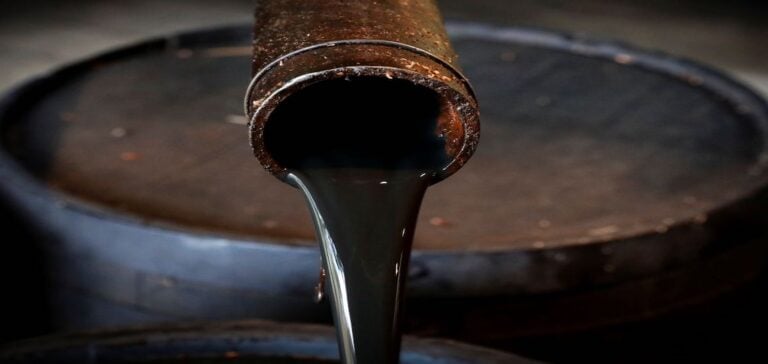TotalEnergies again posted solid profits of $4.1 billion in the second quarter, albeit down 28% year-on-year as a result of the lull in oil and gas prices, which also cost Shell and other oil companies billions.
Back to reality: oil and gas majors’ profits fall in 2023 after a record year in 2022
Last year was exceptional for the majors. TotalEnergies had earned an annual net profit of $20.5 billion (€19 billion), its absolute record after its $16 billion in 2021. Like its Western rivals, the French giant had benefited from soaring oil and gas prices.
At the time, the market was shaken by the post-pandemic economic recovery and, even more so, by the Russian offensive in Ukraine and Moscow’s decision to cut off gas supplies in pipelines to Europe, triggering a rush to ship LNG.
Since then, Europe has diversified its supplies and filled up its stockpiles, contributing to a fall in demand. In the first half of 2023, the Group’s total LNG sales were down 12% year-on-year. Like Repsol, Shell and Equinor, our oil and gas rivals have all reported lower half-year results due to falling prices.
Brent North Sea crude averaged $78.1 a barrel in Q2, a far cry from last year’s average of almost $114 at the same time. On the gas side, TotalEnergies sold its LNG at an average of $9.84/Mbtu (thousands of British thermal units, the reference unit) in Q2, compared with $13.96 in the same quarter of 2022.
The price of oil and gas remains “favorable albeit on the decline”, said TotalEnergies’ CEO, in the press release.
Still “profitable
Despite this downturn, “we have demonstrated that we are profitable”, argued the CEO, in a conference with analysts. The Group has also rewarded its shareholders with a 2nd interim dividend of 74 centimes per share for 2023, up on 2022.
The group is confident, recalling its major investments, both in LNG, to meet “growing demand”, and to develop “profitable” renewable electricity projects, according to the CEO.
TotalEnergies is the world’s third-largest LNG player, and has been investing in gas in the USA, Middle East and Russia for several years. In this country, in December 2022, the Group decided to withdraw its representatives from the board of directors of Russian gas giant Novatek, as a result of the decision to no longer account for its 19.4% stake in this company in its accounts.
“It was a very clear decision”, stressed the CEO on Thursday, indicating that the Group did not anticipate “any return to shareholders (of TotalEnergies) linked to cash coming from Russia”.
TotalEnergies : Controversy and criticism surrounding its investments in Russian gas and fossil fuels
The Group still holds a 20% stake in the Yamal LNG gas field in Siberia, alongside the private Russian company Novatek (50.1%), under a long-term contract. The group has always taken responsibility for these supplies, maintaining that Europe needs them.
“The company continues to buy Russian gas, sending money to the Russian war machine,” denounced Jonathan Noronha-Gant of the NGO Global Witness on Thursday, calling on the EU to sanction Russian LNG.
“If we decided not to take the gas volumes, we would still be obliged to pay for them,” the company replied.
In any case, the Group has stepped up its investments in LNG, announcing last month that it is partnering a new project at the Rio Grande terminal in Texas, a gas liquefaction plant. This has fuelled further criticism from environmental associations, who criticize the Group’s continued investment in fossil fuels.
Greenpeace France commented: “These profits are again and again the fruit of the French major’s climate-friendly strategy, in particular its strategy based on LNG (…) TotalEnergies’ new goose that lays the golden eggs”, while its oil production increased again this quarter, thanks to new fields in Nigeria, Brazil and Oman.
The Group replies that it is multiplying its investments in renewable energies by billions: for example, its intention to develop 3 GW of solar projects in Spain, or the equivalent in wind power in Germany. On Wednesday, it announced the acquisition of 100% of Total Eren, a leader in renewable electricity.






















